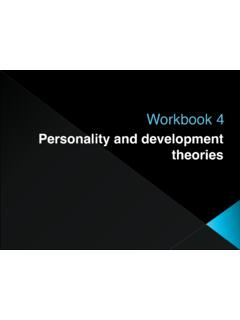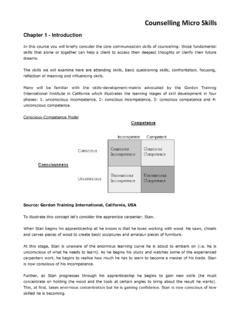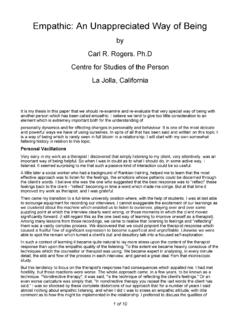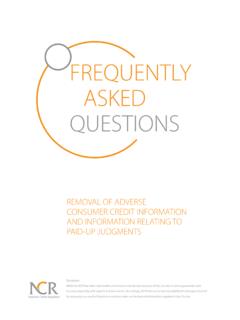Transcription of Verbal & Non-Verbal Communication Skills
1 Verbal & Non-Verbal Communication Skills Report 1 AIPC s Counsellor Skills Series Counselling Microskills An Overview Focusing Encouragers, Paraphrasing and Summarising Questioning Confrontation Reflection of meaning Self-Disclosure Active Listening Body Language An Overview Observation Skills Attending Behaviour Empathy Page 2 AIPC s Counsellor Skills Series, Report 1 About This Series AIPC s Counsellor Skills Series is a 5-Part Series exploring a range of Skills counsellors can utilise to assist clients in achieving optimal outcomes in life. These reports were professionally written for counsellors , Mental Health professionals and other Counselling enthusiasts, and are completely free of cost.
2 We hope you enjoy this reading. We encourage you to forward this publication to friends and colleagues. If you would like to write feedback, email Kind Regards, Sandra Poletto Chief Executive Officer Australian Institute of Professional counsellors Who We Are The Australian Institute of Professional counsellors (AIPC) specializes in providing high quality counsellor education, with a particular focus on external and distance education. AIPC is the largest provider of counselling courses in Australia, with over sixteen years experience in delivering counsellor education programs. We are proud to have helped thousands of people pursue their personal and career interests in counselling.
3 In fact, over 55,000 people in 27 countries have enjoyed our counselling courses. counsellors have a unique opportunity to create a rewarding career helping others gain a higher level of fulfillment in their lives. Join us as we tell you about our counselling courses and the many educational services we offer: Join Our Community Are you a Counselling enthusiast? There are many ways you can join our active community! Simply refer to the links below to subscribe to our free newsletter, keep an eye on our Blog, or follow us on Twitter! AIPC on Twitter: Counselling Connection Blog Institute Inbrief Newsletter AIPC Article Library Page 3 AIPC s Counsellor Skills Series, Report 1 AIPC s Publications You can download other AIPC free publications from Simply visit the URL above and search for the Free Publications section on the Right-Column of the Blog.
4 AIPC s Institute Inbrief A compendium of best articles published in our official newsletter s first 50 editions, from 2003 to early 2007. AIPC s Case Study Collection A collection of 20 professionally-written Case Studies, divided into 5 Categories: Counsellor Microskills; Counselling Therapies; Family Counselling; Grief and Loss Counselling; and Stress Issues in Counselling. AIPC s Counselling Dilemmas A compilation of 18 professionally-written counselling dilemmas, including comments, opinions and strategies from qualified counsellors , psychologists and mental health professionals. AIPC s Five Therapies An exploration of counselling s five mainstream therapies histories, key concepts, applications, benefits, disadvantages and processes.
5 Page 4 AIPC s Counsellor Skills Series, Report 1 Table of Contents About This Series 2 Who We Are 2 Join Our Community 2 AIPC s Publications 3 Verbal Communication Skills 5 Counselling Microskills An Overview 5 Focusing 8 Encouragers, Paraphrasing and Summarising 8 Questioning 10 Confrontation 11 Reflection of meaning 12 Self-Disclosure 12 Active Listening 14 Non-Verbal Communication Skills 15 Body Language An Overview 15 Observation Skills 15 Attending Behaviour 17 Empathy 18 References 19 Contacts 20 Page 5 AIPC s Counsellor Skills Series, Report 1 Verbal Communication Skills COUNSELLING MICROSKILLS AN OVERVIEW Counselling Microskills are specific Skills a counsellor can use to enhance their Communication with clients.
6 These Skills enable a counsellor to effectively build a working alliance and engage clients in discussion that is both helpful and meaningful. Many will be familiar with the Skills -development-matrix advocated by the Gordon Training International Institute in California which illustrates the learning stages of skill development in four phases: 1. unconscious incompetence, 2: conscious incompetence, 3: conscious competence and 4: unconscious competence. Conscious-Competence Model Source: Gordon Training International, California, USA To illustrate this concept let s consider the apprentice carpenter, Stan. When Stan begins his apprenticeship all he knows is that he loves working with wood.
7 He saws, chisels and carves pieces of wood to create basic sculptures and amateur pieces of furniture. At this stage, Stan is unaware of the enormous learning curve he is about to embark on ( he is unconscious of what he needs to learn). As he begins his study and watches some of the experienced carpenters work, he begins to realise how much he has to learn to become a master of his trade. Stan is now conscious of his incompetence. Further, as Stan progresses through his apprenticeship he begins to gain new Skills (he must concentrate on holding the wood and the tools at certain angles to bring about the result he wants). This, at first, takes enormous concentration but he is gaining confidence.
8 Stan is now conscious of how skilled he is becoming. Finally, Stan completes his apprenticeship and goes on to open his own business. In a few years, he is making wonderful pieces of furniture, hardly thinking about what he has to do to bring about the exquisite results he produces. Stan is now unconsciously competent. He simply does his work, barely paying attention to the process (sometimes signing along to the radio in the background). He no longer has to concentrate on every stage of his work. Page 6 AIPC s Counsellor Skills Series, Report 1 In the same way, counsellors build their Skills in Communication by progressing through these stages. counsellors who are finding the use of micro Skills awkward or difficult are likely to be in the consciously incompetent stage.
9 counsellors , who are using the Skills effectively but feel a little unnatural or awkward, are likely to be consciously competent. And counsellors who have learnt the Skills thoroughly and are no longer immediately aware that they are using the Skills are unconsciously competent. It can be reassuring to know that you will progress through the skill-development matrix. It is only a matter of time and practice before you master the Skills and they become second nature to you. SUMMARY OF COUNSELLING Skills Micro-skill Purpose When it s used Examples Attending Behaviour Attending behaviours encourage clients to talk and show that the counsellor is interested in what s being said.
10 Throughout entire counselling interview. Particularly important in the initial stages of establishing rapport. Attentive body language (eye contact, leaning forward slightly, encouraging gestures) Questioning Effective questioning helps guide the counselling conversation and may assist in enriching the client s story. Questioning is useful in the information gathering stage of the interview. It can however be an important skill to use throughout the entire process. What would you like to talk about today? When does the problem occur? Responding Accurate Responding allows the counsellor to confirm with the client that they are being heard correctly. Responding is useful throughout all stages of a counselling interview.













